The Security and Privacy Lab is looking for an hourly-paid Research Assistant. The student will work on IoT security, mobile security, or cloud computing security.
The student is expected to be:
- 1) Eager to solve problems
- 2) Familiar with operating systems
- 3) Familiar with system programming (C is preferred)
If you are interested, please send your resume to Professor Bo Chen (bchen@mtu.edu), Assistant Professor, Department of Computer Science.
Dr. Chen’s website: https://cs.mtu.edu/~bchen
SnP Lab website: https://snp.cs.mtu.edu
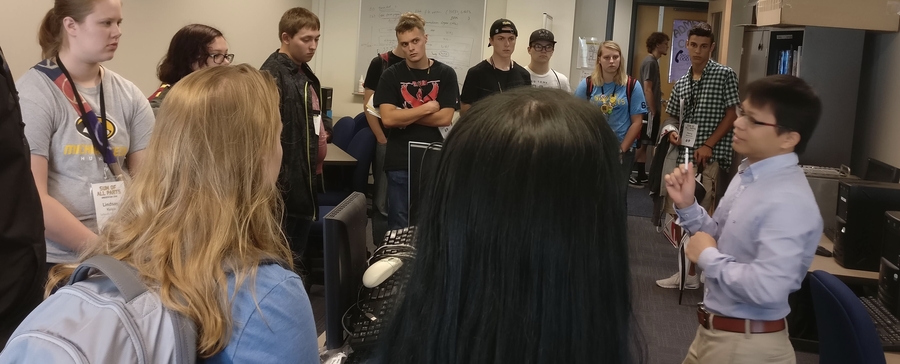
by Computer Science
We are looking for volunteers to take part in a study exploring how people may interact with future augmented reality (AR) interfaces.
During the study, you will record videos of yourself tapping on a printed keyboard. The study takes approximately one hour, and you will be paid $15 for your time. You will complete the study at your home.
To participate, you must meet the following requirements:
- You must have access to an Android mobile phone.
- You must have access to a printer.
- You must be a fluent speaker of English.
- You must be 18 years of age or older.
- You must live in the United States.
If you would like to take part, please contact Reza Habibi at rhabibi@mtu.edu.
Applied Computing: Class of 2021 Special Recognition
Link to the Computer Science Special Recognition awards.
Heather Harris: Outstanding Graduating Senior
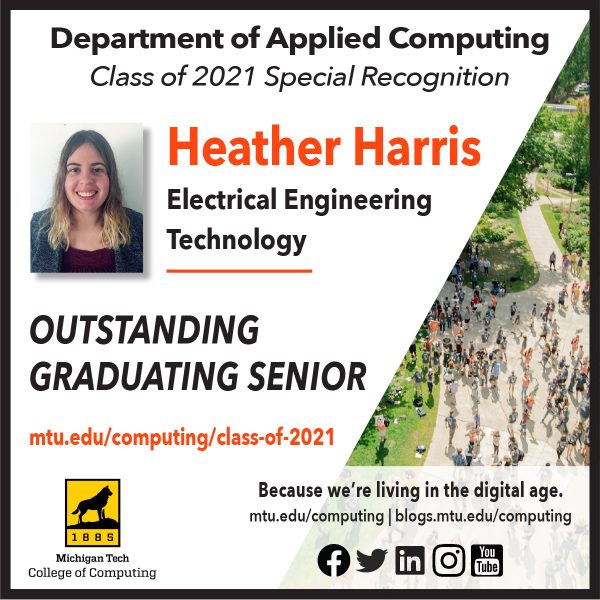
Heather has been an outstanding student ever since she has started at Michigan Tech. She was punctual, rarely missed a class, was a very active participant in class, and never missed an assignment in her EET courses. She also played a major role in the EET Senior Design swingset project. She spent a lot of time on developing the swing and addressing all the comments that were received regarding safety of the final product.
Charles Warren: Outstanding Graduating Senior
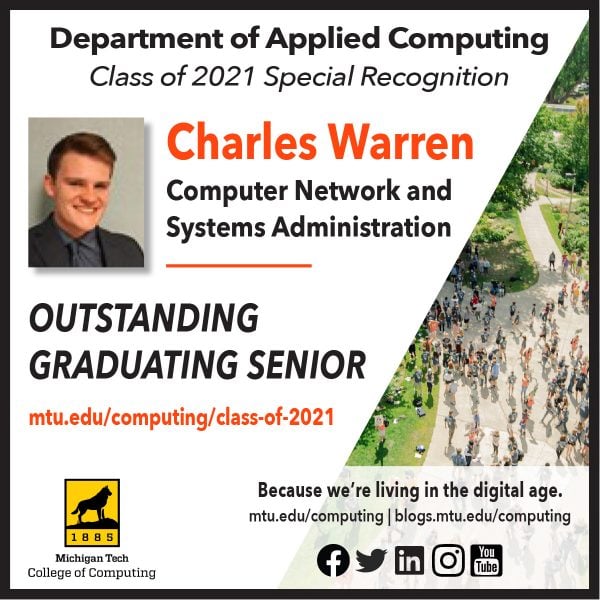
Charles was an undergraduate studying Computer Network and System Administration and a graduate student pursuing an MS in Cybersecurity. He graduated with a cumulative GPA of 3.90 and a departmental GPA of 4.0.
During his time at Michigan Tech he co-founded a student organization that focused on student-led instruction and research in networking and computing topics. It has grown into an undergraduate, graduate, and alumni organization focused on providing cloud and education services at low to no cost as a Non-profit Organization.
Charles has also been an instructor with Dr. Guy Hembroff’s State of Michigan’s Career Technical Education (CTE) funding (2018-2021), which provides local high-school students a cybersecurity curriculum at Michigan Tech.
He is currently working in Palo Alto as a Resident Engineer for security automation. He is a lifelong learner who is always looking to push the boundaries of his industry and to further his own and others’ understanding of topics in computing. His research interests include: cybersecurity, secure design, network security, public key infrastructure (PKI), and Internet of Things (IoT).
Joseph Barbercheck: Outstanding Undergraduate Teaching Assistant
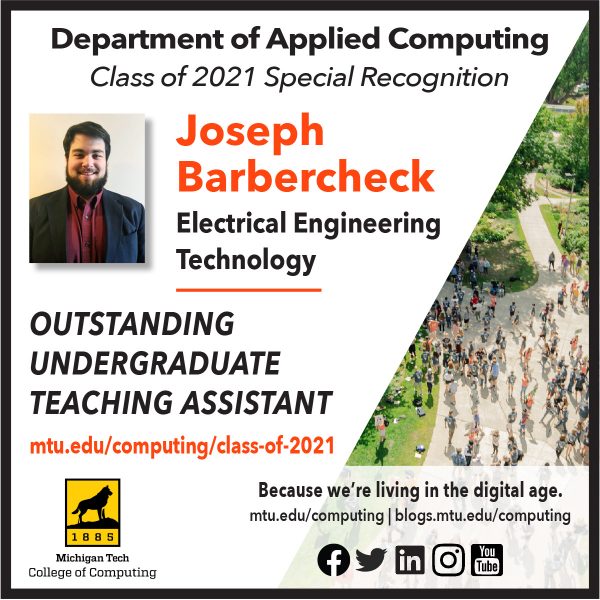
Joe has been a trustworthy and responsible teaching assistant. He has been extremely flexible and has tried his best to help everyone even outside of the scheduled lab times. If a student or a faculty needed extra help, he volunteered his time to make things work.
Besides being an excellent teaching assistant, he also took good care of equipment in the lab and performed routine maintenance tasks such as changing fuses, ordering parts, and stocking the lab with all the necessary components.
Stuart Hoxie: Outstanding Undergraduate Teaching Assistant
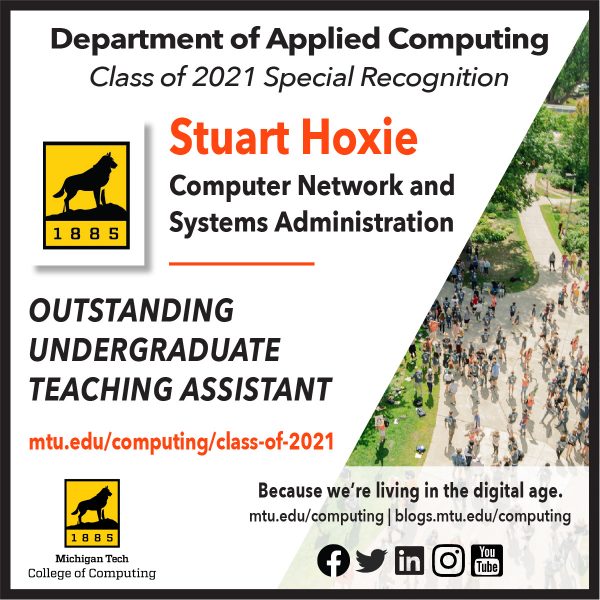
Stuart provided teaching and lab assistance during the Spring 2021 semester for our CNSA and Cybersecurity students in three classes: Microsoft System Administration, Scripting for Automation, Administration, and Security, and Cybersecurity II.
While Stuart has already proven to be a valuable team member working in groups, the Spring semester was his time to exhibit his strong work ethic while operating independently to assist students with both classroom and laboratory questions and issues.
The semester was challenging dealing with COVID and remote work, but Stuart took it in stride – remotely assisting students using the virtual cluster for labs, managing emails and the Canvas course sites, making himself available by attending Zoom meetings, all while reviewing and grading student submissions.
Stuart turned a challenging situation into one of the best semesters for both students and faculty.
Computer Science:
Class of 2021 Special Recognition
Link to the Applied Computing Special Recognition awards.
Vic Felton, Excellence in Teaching
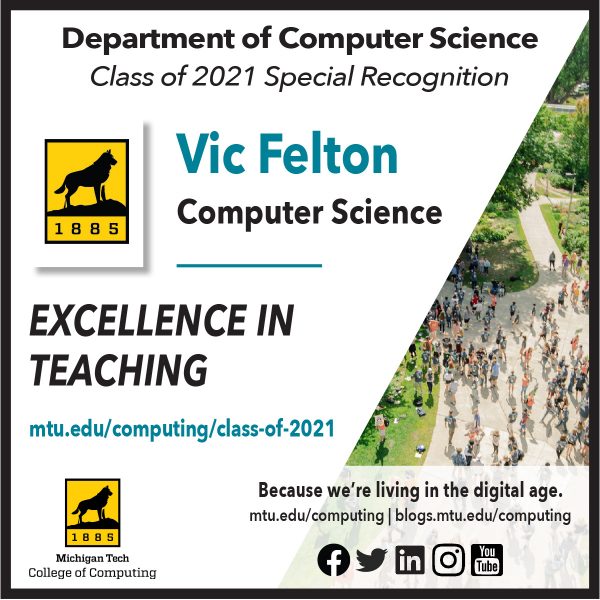
Vic was a standout Lab Assistant in the CS1121 Introduction to Programming course, helping first-time programming students one-on-one in a lab setting that was made even more challenging by COVID-related restrictions.
CS1121 instructor Prof. Briana Bettin describes Vic as “patient and persistent” and adds that his teaching style “has consistently led students to discover the answers to their own questions.”
Sarah Larkin: Excellence in Research and Teaching
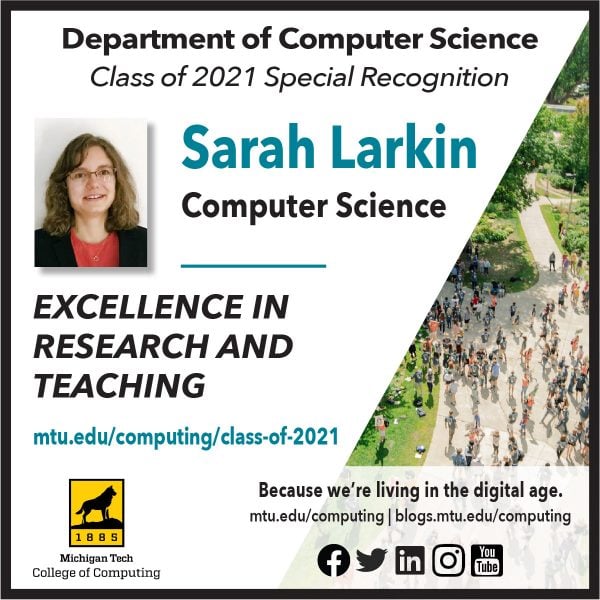
Sarah was supported by the National Science Foundation, through a Research Experiences for Undergraduates (REU) grant, on a project with Prof. Soner Onder to develop a new processor design.
Sarah was also a dedicated and effective Lab Assistant for CS1121, and a longtime contributor to K-12 computer science teaching through WiCS (Women in Computer Science), NCWIT-sponsored Aspire-IT workshops, and Copper Country Coders.
Prof. Briana Bettin says that Sarah “blends curiosity, passion, leadership, and dedication to perfection.” From prospective students and undergraduates she mentors to graduate students and faculty she works alongside, her ethics and devotion are unparalleled and unforgettable.
Alec Rospierski: Excellence in Leadership
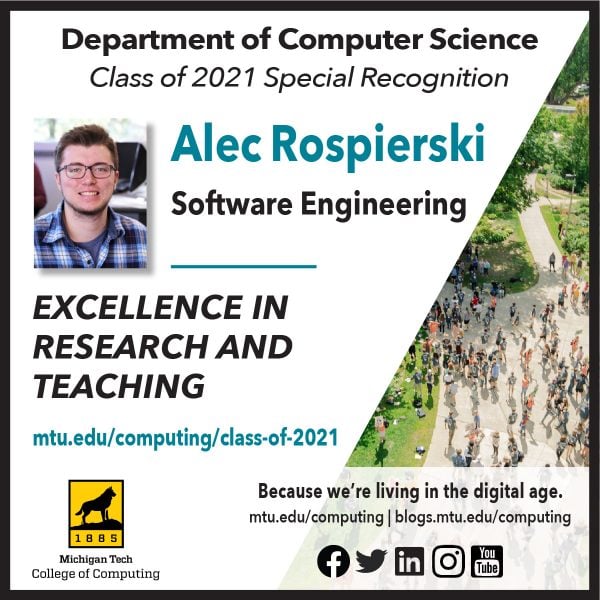
Alec led a Senior Design team in developing the Micro:bit app, allowing middle and high school students to conduct science experiments online. This project was a collaboration between Michigan Tech and Washington University in St. Louis.
He also served as team leader in the User Interface course in developing an app allowing middle and high school students to conduct simulation of the spread of COVID and other infectious diseases.
Katie Schmidt: Excellence in Leadership
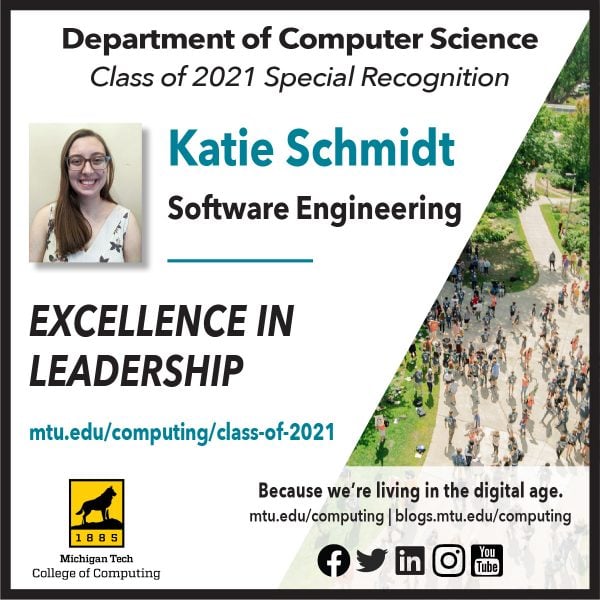
Katie served as President of the Copper Country Coders student organization. This group works with local middle and high school students, providing small-group courses in computer science and programming.
Under her leadership, Coders made great strides in developing a sustainable organizational structure, recruiting new members, and creating an engaged community of student instructors through reflection meetings and social events.
Prof. Charles Wallace, faculty co-advisor of Copper Country Coders praises “Katie’s ability to lead in an inclusive and compassionate way that inspires others.”
by Allison Mills, University Marketing and Communications

A major challenge for fully autonomous vehicles is navigating bad weather. Snow especially confounds crucial sensor data that helps a vehicle gauge depth, find obstacles and keep on the correct side of the yellow line, assuming it is visible. Averaging more than 200 inches of snow every winter, Michigan’s Keweenaw Peninsula is the perfect place to push autonomous vehicle tech to its limits.
In two papers presented at SPIE Defense + Commercial Sensing 2021, researchers from Michigan Technological University discuss solutions for snowy driving scenarios that could help bring self-driving options to snowy cities like Chicago, Detroit, Minneapolis and Toronto.
The team includes Nathir Rawashdeh and doctoral student Abu-Alrub (CC) as well as Jeremy Bos and student researchers Akhil Kurup, Derek Chopp and Zach Jeffries (ECE).
Read more about their collaborative mobility research on mtu.edu/news.
This MTU news story was published by Science Daily, TechXplore, Knowridge Science Report and other research news aggregators.
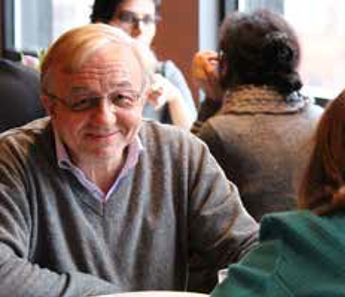
Professor Soner Onder, Computer Science, has been awarded $150K of a $300K project funded by the Office of International Science and Engineering (OISE) and the International Research Experiences for Students (IRES) programs, both units of the National Science Foundation (NSF). The remaining project share was awarded to Florida State University (FSU).
The project provides international research experiences for eight Michigan Tech PhD students (and eight FSU students), providing a stipend, travel expenses, and living expenses while they pursue research in Norway for ten weeks in each of three summers.
The students will be working with Dr. Onder’s collaborators at Norwegian University of Science and Technology (NTNU), Prof. Magnus Jahre and Prof. Magnus Själander. The two institutions are pursuing joint interdisciplinary work involving compilers and architecture . The work is expected to result in several joint research publications.
“I believe this project will help improve our international recognition and stature as a major research institution,” Dr. Onder says.
Abstract
When the technology for computers advance and programs execute faster, more computer applications become possible. This project will enable Florida State University (FSU) and Michigan Technology University (MTU) students to visit the Norwegian University of Science and Technology (NTNU) to conduct research that will allow the performance and energy efficiency of computer applications to be automatically improved. Over the three years of this project, 16 FSU and MTU students (in cohorts of five, five, and six) will visit NTNU, which is in Trondheim, Norway, for a period of 10 weeks during May, June, and July. While in residence, the students will work closely with the faculty, postdoctoral associates, and graduate students in the research groups of Professors Magnus Sjalander and Magnus Jahre who are affiliated with the Computer Architecture Laboratory (CAL) at NTNU. The participating FSU and MTU students will not only increase their research knowledge, but will also become more globally engaged and better prepared to work in a culturally diverse, international environment.
The era of improving processor performance without innovations in computer architecture or compilers is over since increasing the clock rate for computers has not been possible in recent years due to thermal limitations. However, manually modifying programs to efficiently exploit computer architectures is time consuming, error prone, and not portable to other systems. The most effective way to improve application performance is to automatically exploit architectural features without the intervention of the application developers. Our focus will be on automatically achieving high performance and energy efficiency by generating code to exploit existing and proposed architectural features at the machine instruction level. We propose to develop the compilation tools to facilitate the process of automatically generating code to exploit these proposed architectural features and to develop the simulation tools to evaluate the impact on both performance and energy efficiency.
The Norwegian University of Science and Technology (NTNU) is the second largest university in Norway and is consistently ranked among the top one percent of universities world-wide; their current ranking is 101st.
Office of International Science & Engineering (OISE) is the NSF focal point for international science and engineering activities both inside and outside NSF. OISE’s focuses on three activities: (1) promoting the development of a globally competent U.S. workforce, (2) facilitating and supporting international partnerships and networks to leverage NSF and foreign resources, and (3) providing opportunities for U.S. leadership to shape the global science and engineering agenda.
The International Research Experiences for Students (IRES) program supports international research and research-related activities for U.S. science and engineering students. The IRES program contributes to development of a diverse, globally engaged workforce with world-class skills. IRES focuses on active research participation by undergraduate and/or graduate students in high quality international research, education and professional development experiences in NSF-funded research areas.
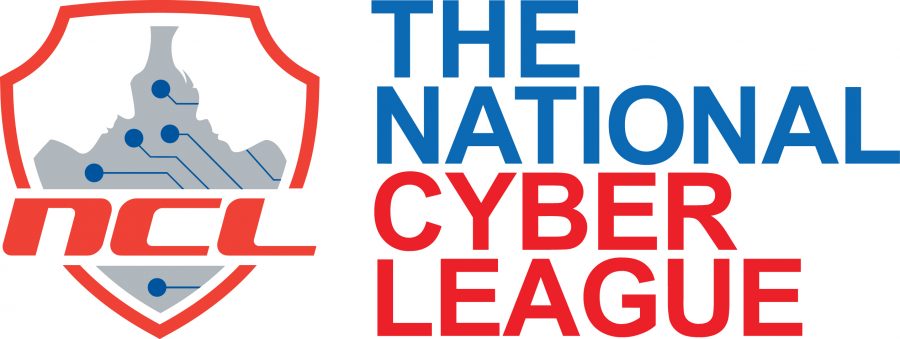
Michigan Tech ranks number three (3) in the Spring 2021 National Cyber League’s Cyber Power Rankings, rising 12 points from a Fall 2020 ranking of 15. One hundred (100) teams were ranked.
In the NCL cyber-competitions, thousands of students from hundreds of colleges and universities nationwide are challenged to identify hackers from forensic data, pentest and audit vulnerable websites, recover from ransomware attacks, and more.

Three factors are considered in a school’s annual Cyber Power Ranking. In descending magnitude of weight, they are:
- The school’s top performing team during the Team Game
- The school’s top performing student during the Individual Game
- The number of participating students from the school, with additional consideration given to better student performance during the Individual Game
Schools are ranked based on their top team performance, their top student’s individual performance, and the aggregate individual performance of their students. The rankings represent the ability of students from these schools to perform real-world cybersecurity tasks on the Cyber Skyline platform.
See how the NCL competitions work.
View the full list of NCL rankings.
The Cyber Power Rankings were created by Cyber Skyline in partnership with the National Cyber League (NCL). Every year, over 10,000 students from more than 300 colleges and universities across the US participate in the NCL competitions.